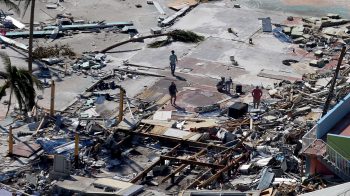The market doesn’t charge for Florida’s climate risk
Twenty-year government bonds and thirty-year mortgages are bumping into the horizons for serious damage to South Florida from rising seas. So far, those enormous risks haven’t sent home prices tumbling, or sent borrowing costs skyrocketing. The trillion-dollar question is: When and how will the market start charging for those risks?
Financially, the most important piece of information about rising seas clobbering Miami and South Florida is the one nobody knows: When, exactly?
“Geologic time doesn’t give us that answer,” says John Englander, author of “High Tide on Main Street: Rising Sea Level and the Coming Coastal Crisis.”
“It doesn’t get us down to human time scale of, ‘What decade will it happen?'” he says. “Or, ‘What year will it happen?'”
As a Fort Lauderdale home-owner, Englander thinks that uncertainty works to his advantage, for now. He thinks he might sell in five or ten years — to get out while the getting is good — and he thinks his case isn’t unusual. Even though the typical mortgage is 30 years, many home-owners think about their investment in five-year increments.
That’s the same horizon bond-rating agencies use when they evaluate public-works plans. That’s as far as they can look, says Geoff Buswick, who runs the public-finance infrastructure group at Standard and Poors.
“Once you get past that, the financial forecasts are softer,” he says. “Fifteen years from now, it could be a completely different management team, and a completely different environment.”
There’s a reason big investors are OK with a five-year evaluations of what may be, on paper, a bond with a 20, or 30 or 100-year payoff.
“They’re not planning on holding that for 30 or a hundred years,” says Sharlene Leurig, who runs the sustainable water infrastructure program for the non-profit Ceres. “They’re planning on flipping it, maybe in eight.”
So, from all sides, the risks don’t get priced into the market.
“Everyone thinks they’re going to be the first to realize where the risk is, the first to liquidate,” says Leurig. “And that there will be an opportunity to roll that capital into the next thing, which will be less risky.”
Keith London seems like someone who should be especially concerned about the risks of South Florida real estate. He’s a city commissioner and longtime homeowner in the Miami suburb of Hallandale Beach. Rising seas have already required some big spending there, just to protect the city’s drinking water supply.
But he doesn’t think his town has it worse. Just first.
“We are the canary in the coal mine,” he says. “We have all the issues and all the problems. But this is a bigger problem than just South Florida. There’s going to be global disruptions, everywhere.”
He hopes that means global mobilization to address the challenges.
Meanwhile, he thinks South Florida is a fine place to live.
There’s a lot happening in the world. Through it all, Marketplace is here for you.
You rely on Marketplace to break down the world’s events and tell you how it affects you in a fact-based, approachable way. We rely on your financial support to keep making that possible.
Your donation today powers the independent journalism that you rely on. For just $5/month, you can help sustain Marketplace so we can keep reporting on the things that matter to you.


















